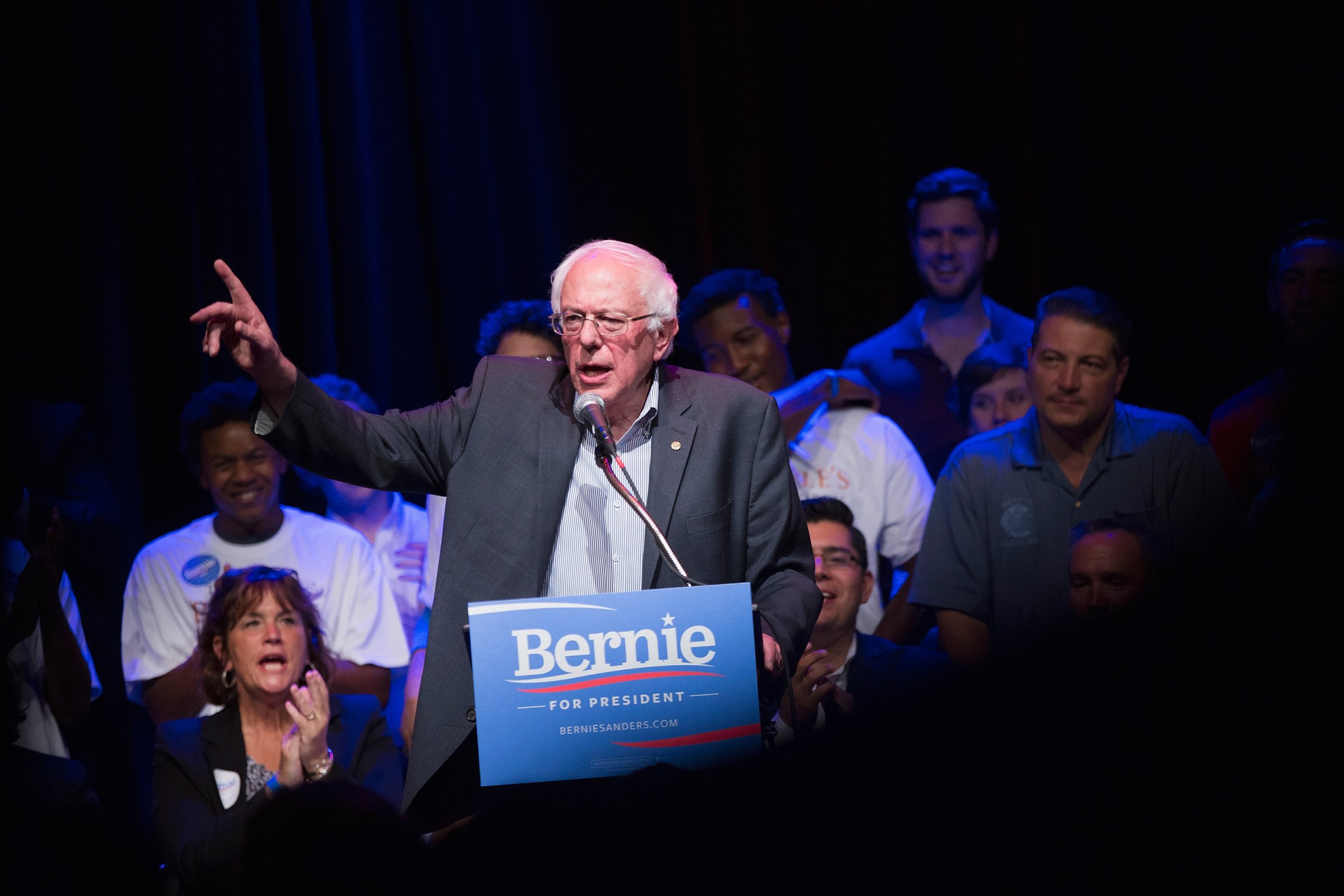
Vermont Senator Bernie Sanders has been hearing it from all sides. A former governor’s top staffer begged him to consider participating in an additional Democratic primary debate. A television outlet reached out repeatedly, eager to sponsor one. Thousands of the Vermont Senators’ fans signed petitions, appealing for more televised contests.
But the surging Democratic presidential candidate has been unmoved. In the midst of ongoing pressure for more Democratic primary debates, it’s increasingly unlikely that Vermont Sen. Bernie Sanders will flout the Democratic National Committee’s strict rules that threaten punishment for any candidate who attend more than the six official debates.
Fearful of risking exclusion from a major national debate against Hillary Clinton, or elevating some of his lesser rivals, Sanders’ campaign has said he will not debate unless all the Democratic candidates for president are on the stage.
For former Maryland Gov. Martin O’Malley, who is stalled at 1% in national polls despite months of campaigning and 15 years of executive experience, an appearance in a Democratic debate could be a decisive factor in his campaign, giving him a wide national audience to boost his name recognition. But Sanders is already attracting huge crowds of as large as 28,000 and has already surpassed Hillary Clinton in two polls in New Hampshire. “The O’Malley campaign was instantly excited and ready to go,” said a source at the TV outlet, referring to his efforts to organize an additional debate. “Sanders’ campaign has been impossible to get in touch with.”
“Sanders holds all the cards,” the source continued. “But right now he’s not playing.”
O’Malley and Sanders have both repeatedly called for more debates than the six sanctioned by the Democratic party, whose leadership has said it will punish presidential candidates who debate outside its framework by disqualifying them from further debate. At stake is crucial airtime and publicity for upstart candidates on a national stage, and the Democratic party’s chance to hash out its differences and policies from social security, immigration reform to Wall Street regulation.
“At a time when many Americans are demoralized about politics and have given up on the political process, I think it’s imperative that we have as many debates as possible,” Sanders said in a statement earlier this month. “I look forward to working with the DNC to see if we can significantly expand the proposed debate schedule.”
In recent days, however, Sanders’ campaign has rebuffed at least one TV outlet’s efforts to draw Sanders into an additional debate outside the six sanctioned by the Democratic National Committee. Earlier this month, his campaign manager brushed off a call from Gov. Martin O’Malley’s staff seeking further debate.
“It is not in Sanders’ self-interest to give up the possibility of debating Hillary Clinton,” said Kathleen Jamieson, director of the Annenberg Public Policy Center at the University of Pennsylvania. “His advantage is to be in the same stage as her, demonstrating that he can hold his own. He is doing well enough in the polls that forgoing that would be foolish.”
For each candidate, the debates are a challenge and an opportunity. It’s in frontrunner Hillary Clinton’s interest to hold fewer debates and minimize exposure; she is sticking with the debate schedule, which rivals say was crafted by her party allies. It’s in low-polling O’Malley interest to get as much airtime as possible; he wants many more debates, and appears willing to debate without Clinton. And with Sanders surging in the polls, it benefits him most to challenge Clinton directly.
The DNC “has created a structure of mutual self interest,” Jamieson said.
Meanwhile, progressive activists, including many Sanders supporters, have accused the party of sheltering Hillary Clinton from a potentially damaging debate against her rivals for the nomination. Sanders’ base is calling on the DNC with increasing urgency to open up the debate schedule, tweeting and calling the DNC at a furious rate. “The Democratic National Committee isn’t playing fair,” said Bernie activists and VoteForBernie.org.
An angry group repeatedly booed Democratic National Committee chairwoman Debbie Wasserman Shultz at the Iowa State Fair’s soapbox on Saturday. Some in the annoyed audience scuffled with the protestors in a tense standoff.
On Tuesday, the Concord Monitor published an op-ed by two New Hampshire Democrats accusing “the Democratic hierarchy” of allowing Donald Trump and the Republicans to seize the spotlight. And Sanders’ Reddit following has called at an unceasing pitch for more debates.
Critics compare this year’s six debates to 2008, when Clinton and Barack Obama debated more than a dozen times before the Iowa caucus, mostly outside of the DNC framework. Supporters of the DNC’s rule point to 2008’s grueling schedule and the wearying effect it had on candidates.
Sanders has hinted he’s open to debates with labor union groups, “environmental groups, women’s groups, gay groups,” and “different constituencies,” adding “the more debates, the better.” But only, it seems, if Clinton is there, too.
“Our view is that there should be more debates, but that they must involve all of the candidates,” said spokesman Michael Briggs in a recent statement to TIME.
In a petition circulated by the Sanders campaign earlier this summer, Sanders said “I know that if Secretary Clinton wants more debates, we’ll get them.”
More Must-Reads from TIME
- Donald Trump Is TIME's 2024 Person of the Year
- Why We Chose Trump as Person of the Year
- Is Intermittent Fasting Good or Bad for You?
- The 100 Must-Read Books of 2024
- The 20 Best Christmas TV Episodes
- Column: If Optimism Feels Ridiculous Now, Try Hope
- The Future of Climate Action Is Trade Policy
- Merle Bombardieri Is Helping People Make the Baby Decision
Contact us at letters@time.com